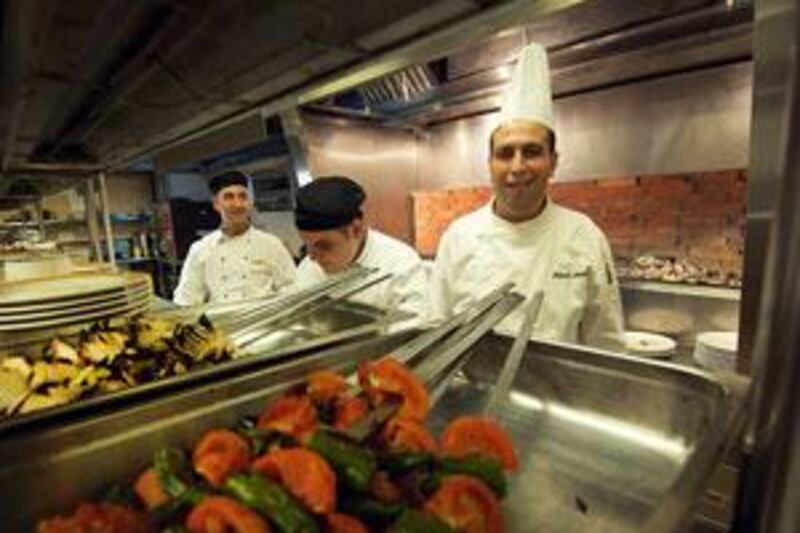My earliest memory of food is helping my mother cook when I was eight years old. I used to love seeing her prepare elaborate dishes like stuffed vine leaves and kebbes, which are very hard to make. They're balls of minced semolina and meat, stuffed with more meat, onion and nuts, so the preparation is very meticulous. She always had a passion for cooking and I gained that from her. I am from Nebl, a village north of Aleppo. But when I was 10 we moved to Aleppo. I am from a big family, and there were twelve children, so financially, our situation wasn't good. During the school holidays I used to work in a restaurant, and when I was 14, I left school to move to Jordan and work in a restaurant there. I stayed for five years. It wasn't easy at all. I went back to visit every three or four months because I was so homesick. Of course I missed my family. But I also missed my mother's cooking and all the smells and spices of Aleppo.
Aleppo is the second largest city in Syria after Damascus. It's a very old city, and a very inspiring city. It's famous for a style of singing called qudood, which is very beautiful. In the Arab world, people like to sit eating for hours in the evening and in Aleppo there is always singing and music going on while people are eating. My favourite quood singer is Sabah Fakhri who is the most famous performer of traditional qudood. His name is in the Guinness Book of Records for the time when he was performing in Caracas and he sang for 10 hours without a pause.
I came to work at the Four Seasons hotel in Damascus because of a what you might call a culinary kidnapping. I was working in a restaurant in Aleppo and the general managers from the Four Seasons came in. It was before the hotel opened, and they were looking for an Aleppian chef. They tried my cooking and offered me the job. I went with them to Damascus the same day. It was sudden but it was also love at first sight. Working at the Four Seasons is my dream come true. I have the freedom to do what I want creatively. There are a lot of guests here, and they have very high standards. Every day brings a new challenge. I like to keep on creating. I'm always experimenting with new flavours and new ingredients.
What I like most about being a chef is the idea that I can contribute to the awareness of Syrian cuisine. In my opinion, Syria has the best food in the Middle East. In Syria, the ingredients - the vegetables, herbs, and spices - are different than in the rest of the region. And Syrian food itself is diverse - it differs from city to city. But no matter where you go, the ingredients in Syrian food have to be very, very fresh.
I like meeting my guests and asking them how they like the dishes. In Damascus they are often surprised to get such good Aleppian food so far away from Aleppo. Also, by talking to the guests I can get the feedback I need. Aleppian food is strongly influenced by Turkey and it can be very spicy, so by talking to the guests I can change the spice balance and cater to their tastes. Ten years ago, I worked in a restaurant in Uzbekistan for one year. It was a great experience for me. I experienced a new culture, new food and completely new flavours. It gave me a lot of inspiration. They don't use many spices in Uzbekistan, but they are well known for a rice dish called ploff. We have a dish like that in Syria. And we also have a meat dish like theirs. Ours is called shish barak, which is a small meat-pie dumpling cooked and served in a yogurt sauce made with garlic and coriander. So there were some similarities. All of the travelling I have done has made me the chef that I am. All the new things I have discovered, all the flavours and cultures I have experienced - they have all given me my style of cooking.
My proudest moment as a chef was five years ago. I was working in a restaurant in Aleppo where they did not serve authentic Aleppian cuisine, so I established a completely new Aleppian kitchen. They are still working to my instructions and standards, and the restaurant has a reputation for great Aleppian food. To be a good chef, you must love your job. And you have to be prepared to work long hours. I can work 12, 13 hours a day. Sometimes I work 18 hours a day. But I have such a passion for cooking that I don't notice that time is passing. I am absorbed in my work. And then you must demand that all of your ingredients - meat, vegetables, cheese - must be fresh, fresh fresh! At the opening of the Four Seasons hotel in March 2006, I cooked for the president and the Prince Walid Bin Tala. The president asked to see me and he congratulated me on my delicious cuisine. But I wasn't nervous while preparing the food. I was very confident thanks to the great ingredients I had.
I have six children, three boys and three girls. My eldest daughter is 10 years old and she loves cooking. I can see that she has a passion for it. She is always asking me questions about food. She will be a very good chef very soon. * Fay Schopen





